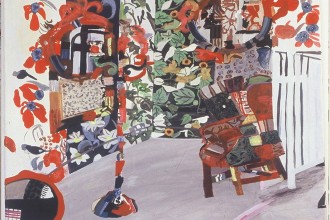Every house in the Estate has its curtains drawn. Apart from the streetlamps and the odd red-eyed alarm, the estate is completely dark. We are parked three houses from the Williamson’s house on the opposite side. My brother is inside this house. Any minute now he will turn the key in their patio door and come creeping down the driveway, twisting himself sideways to edge past Mr. Williamson’s speedboat. His pockets will be full of credit cards and small, but valuable, items easy to sell on the Internet. Mammy always puts Owen in trousers with deep pockets when he’s on a job. She is clever like that, thinking of problems before they happen so they are not even really problems.
“What time is it now, Samuel?†Mammy asks. (The digital clock on the Saxo only works when you have the engine on).
Dad tugs at the elbow of his jumper, eases his sleeve over his watch and whispers, “ten past two, Pearl,†as if someone might be listening outside the door. “Any minute now, the wee man’ll come bolting round yon corner and we’ll be out of here.â€
We all lean forward, peering through the sweaty windscreen at the street and the hedges and the spot which will, any second now, be Owen, running.
“Next time, I could go,†I suggest.
“No way,†says Mammy, as she always does. In the two seconds it takes to form her next sentence I tell myself, this is because she loves me more than Owen. She is trying to protect me, I tell myself. The believing of this is warm all around me, and spreading out across the backseat, like when you are in the swimmers and allow yourself to piss a little and float in your own heat. Then she says, “you’re too old, Paddy,†and all the good feeling is gone.
“Nobody wants to adopt a ten-year-old,†continues Dad. “They only go for Owen ‘cause he’s five and he looks like a wee angel.â€
“Like a young Macauley Culkin,†adds Mammy, “before he got into the drugs and the sexual stuff. Folks look at that wee face and they can’t get their front door open quick enough. The child’s a bloody goldmine.â€
“Folks look at your face Paddy and they go off the idea of children altogether,†says Dad. He winks at me and I can see it, backwards in the rear view mirror.
“It’s not your fault, Son,†Mammy butts in. “You take after your Da, not me.â€
Owen stops in front of Mammy. He is close enough to be heard without raising his voice but far enough away to be beyond her reach. I can tell from the way she is holding her arms that she wants to hug him. She is not a very good Mammy but I think she still worries about us, especially Owen, when he’s on a job.
“Get in the car, son,†she says.
“Naw, Mammy,†replies my brother, “I fancy staying with these ones. They’re nice.â€
“Get in the car, Owen,†she repeats. My Dad leans across the handbrake and shouts, “get in the bloody car now, Owen.†He is not even using his John Wayne voice.
“They’re going to call me Miles,†says my brother. “I’ve got my own bunk beds; two whole beds and there’s only one of me.â€
“Get in the car,†all three of us shout. Mammy makes a lunge for Owen and he stumbles a little trying to avoid her. He is wearing the kind of slippers children wore in the wartime. His hair is split in a line down the middle so all his curls are flat.
“I’ll skin you, if you don’t get in the car right now, Owen,†shouts my Dad.
My brother begins to cry, quietly at first and then with a kind of crazy edge like an out of control truck thundering down a hill. A light goes on in the house closest to us.
“I don’t want to do the stealing any more,†screams Owen. He does not look like a young Macauley Culkin now. He looks like a just born baby all pink-faced and screaming, “it’s not fair. Why doesn’t Paddy have to do it?â€
“I will,†I say, “I’ll totally do it.â€
Nobody hears me. Mammy takes three steps towards my brother. She wraps her arms around his arms and braces him against her chest as if he was a sack of new potatoes. She throws him in the backseat and does not even bother with his seatbelt.
“Drive,†she says to Dad and neither of them bother with their seatbelts either.
“I could make myself look younger than I am,†I say. “I could wear, like a Disney jumper or something.â€
“Wee bugger didn’t even lift a credit card,†my Mammy mumbles to herself.
“At least we’ve got the deposit,†says Dad. They both turn their heads to look at the glove compartment where Mammy has stashed six grand in fifty pound notes.
“He’s getting too old for this, Samuel.â€
“We only need him to do it two more times.â€
“You’re right; two more jobs, and then Australia.â€
“And if worst comes to worst, Pearl, I can always take my belt to him; for his own good.â€
In the backseat, my brother is still crying. He reaches through the dark for my hand and I will not take it.
“You could have stayed with them,†I hiss in his ear. I hate my brother for coming back to the Saxo, for still being the one they need.
In the front my Dad has turned the radio back on and it is Bon Jovi, the one about saying a prayer. I think this is their most famous song.
Jan Carson is a writer and community arts development officer currently based in Belfast, Northern Ireland. Her first novel, ‘Malcolm Orange Disappears’ was published by Liberties Press, Dublin in June 2014. In the same year, she was a recipient of the Arts Council NI Artist’s Career Enhancement Bursary. Jan’s short story collection ‘Children’s Children’ was published by Liberties Press in February 2016.




